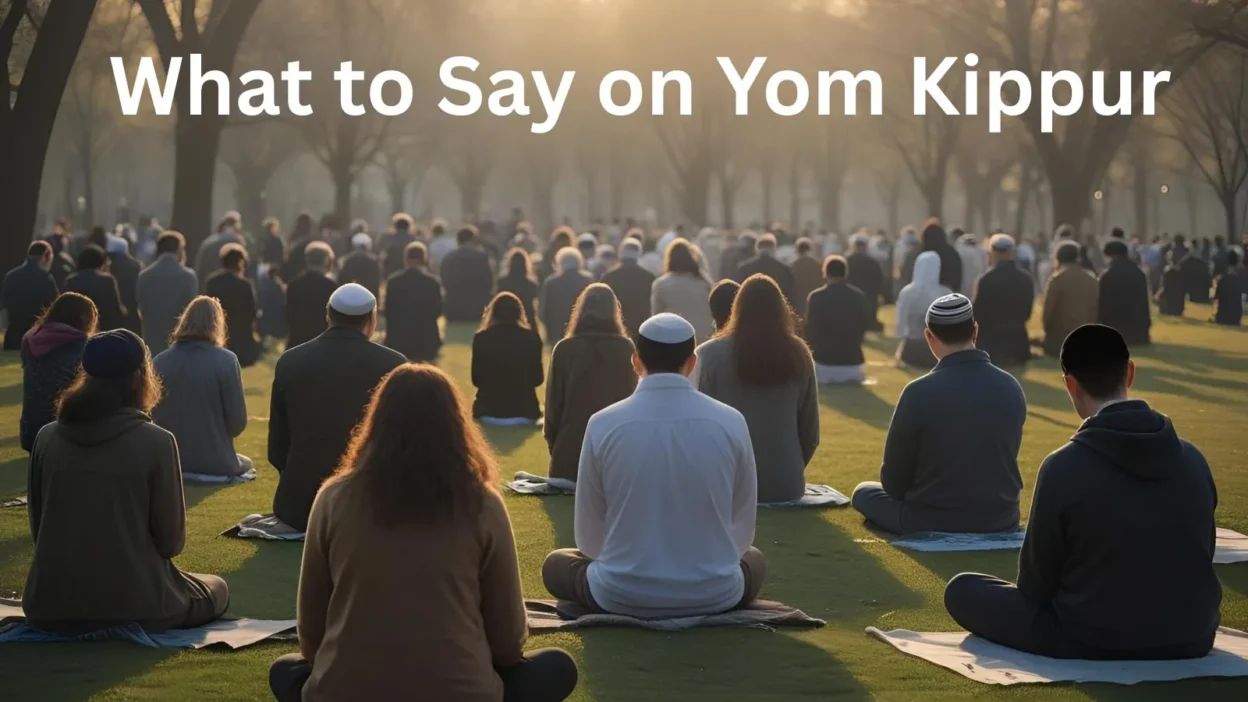Yom Kippur, the Jewish Day of Atonement, is a time for reflection, forgiveness, and spiritual renewal.
It’s a sacred day when words carry deep weight, whether you’re seeking forgiveness, offering support, or praying for peace. Knowing what to say on Yom Kippur can feel overwhelming—how do you express sincerity without sounding rehearsed?
This guide will help you find the right words to connect meaningfully with others during this holy day. From apologies to greetings, we’ll explore practical ways to communicate with heart and respect, ensuring your words align with the spirit of Yom Kippur.
Let’s dive into how you can make your conversations and prayers shine during this time of introspection.
Understanding the Importance of Words on Yom Kippur
Yom Kippur is all about making things right—with yourself, others, and God. Words are powerful tools for healing and connection. On this day, Jews fast, pray, and seek forgiveness, making conversations deeply personal. Saying the wrong thing, like casual small talk, can feel out of place.
Example: Imagine you’ve had a disagreement with a friend. Yom Kippur is the perfect time to mend that bond. You might say, “I’m sorry for what I said last month. I value our friendship and want to make things right.” Avoid generic apologies like, “Sorry if I upset you,” as they may seem insincere.
Scenario: At synagogue, you notice someone looking emotional. Instead of asking, “What’s wrong?” try, “I’m here if you need to talk.” This shows support without prying.
How to Offer a Sincere Apology
Apologizing on Yom Kippur is a key tradition called teshuvah (repentance). A good apology is specific, heartfelt, and shows you’ve reflected on your actions. It’s not just about saying sorry—it’s about showing you understand the hurt caused.
Example: If you snapped at a coworker, you could say, “I regret raising my voice during our meeting. It wasn’t fair, and I’ll work on staying calm.” Don’t say, “Let’s just move on,” as it dismisses their feelings.
Scenario: Suppose you forgot to call your sibling on their birthday. On Yom Kippur, reach out: “I’m so sorry I missed your birthday. It wasn’t intentional, and I’ll make it up to you.” This shows accountability and care, aligning with the day’s focus on repair.
Greetings to Share on Yom Kippur
Yom Kippur greetings should reflect the day’s solemn tone. Common phrases include “G’mar Chatimah Tovah” (May you be sealed for a good year) or “Have an easy fast.” These show respect for the holiday’s spiritual weight.
Example: When greeting a friend, say, “Wishing you a meaningful Yom Kippur and an easy fast.” Avoid casual phrases like, “Happy Yom Kippur,” as the day isn’t celebratory.
Scenario: At a Yom Kippur service, you meet a neighbor. You might say, “G’mar Chatimah Tovah! May this year bring you peace.” This keeps the tone warm yet reverent, fostering connection without being overly casual.
What to Say During Yom Kippur Prayers
Prayers on Yom Kippur, like the Vidui (confession), are central to the day. If you’re leading or joining prayers, your words should be humble and reflective. Even personal prayers can benefit from intention.
Example: During a quiet moment, you might pray, “Please forgive me for my mistakes and guide me to be kinder.” Avoid vague prayers like, “Help me be better,” as specificity deepens the experience.
Scenario: If you’re supporting someone new to Yom Kippur services, explain gently: “The Vidui helps us admit our wrongs together—it’s okay to feel emotional.” This reassures them while keeping the focus on the prayer’s purpose.
Supporting Others on Yom Kippur
Yom Kippur can be emotionally intense, especially for those fasting or reflecting on loss. Offering words of comfort can make a big difference. Listen actively and speak with empathy.
Example: If a friend is struggling with the fast, say, “You’re doing great—take it one moment at a time.” Don’t say, “It’s just one day,” as it minimizes their effort.
Scenario: At a Yom Kippur break-fast meal, someone shares a personal loss. Respond with, “I’m so sorry. I’m here for you, today and always.” This shows care without pushing for details, honoring the day’s reflective mood.
What Not to Say on Yom Kippur
Knowing what not to say is just as important. Avoid casual or insensitive comments that clash with Yom Kippur’s solemnity. Topics like food, parties, or gossip are best saved for another time.
Example: Don’t say, “I’m starving, let’s eat soon!” to someone fasting. Instead, say, “I admire your strength today.” This respects their commitment.
Scenario: If someone is praying intensely, don’t interrupt with, “What’s for dinner later?” A better approach is waiting quietly or offering a nod of support. Keeping the focus on the day’s purpose strengthens connections.
Final Thoughts on What to Say on Yom Kippur
Yom Kippur is a day to speak with intention, whether you’re apologizing, praying, or supporting others. By choosing what to say on Yom Kippur carefully, you honor its spirit of reflection and renewal.
From sincere apologies to thoughtful greetings like “G’mar Chatimah Tovah,” your words can heal and uplift. Avoid casual or dismissive phrases, and focus on empathy and respect.
As you navigate this sacred day, let your words reflect your heart’s desire for forgiveness, peace, and connection. May your Yom Kippur be meaningful and your words a source of light.SEO Title Tag: What to Say on Yom Kippur: Words for Atonement.




